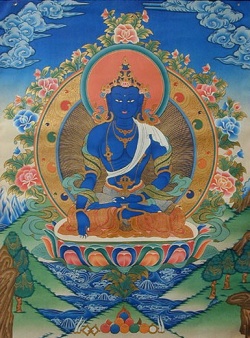Difference between revisions of "Five or seven characters"
| Line 1: | Line 1: | ||
[[File:Akshobhya1jh.jpg|thumb|250px|]] | [[File:Akshobhya1jh.jpg|thumb|250px|]] | ||
| + | |||
| + | |||
| + | |||
| + | |||
| + | |||
<poem> | <poem> | ||
| − | five or seven characters | + | [[five or seven characters]] |
[五字七字] (Jpn goji-shichiji ) | [五字七字] (Jpn goji-shichiji ) | ||
| − | The "five characters" indicating Myoho-renge-kyo, which consists of five Chinese characters (pronounced in Japanese)—myo, ho, ren, ge, and kyo, and the "seven characters," Nam-myoho-renge-kyo, which comprises two additional Chinese characters, nan or na, and mu. Nichiren (1222-1282) often uses Myoho-renge-kyo synonymously with Nam-myoho-renge-kyo in his writings. Nam or namu is a compound of the two Chinese characters of nan and mu. In his work On Offering Prayers to the Mandala of the Mystic Law, Nichiren states: "I have offered prayers to the Gohonzon of Myoho-renge-kyo. Though this mandala has but five or seven characters, it is the teacher of all Buddhas throughout the three existences and the seal that guarantees the enlightenment of all women. It will be a lamp in the darkness of the road to the next world and a fine horse to carry you over the mountains of death.... It is the teacher who leads all people to Buddhahood and enlightenment" | + | The "five characters" indicating [[Myoho-renge-kyo]], which consists of five {{Wiki|Chinese}} characters (pronounced in Japanese)—myo, ho, ren, ge, and [[kyo]], and the "seven characters," [[Nam-myoho-renge-kyo]], which comprises two additional {{Wiki|Chinese}} characters, nan or na, and mu. [[Nichiren]] (1222-1282) often uses [[Myoho-renge-kyo]] synonymously with [[Nam-myoho-renge-kyo]] in his writings. Nam or [[namu]] is a compound of the two {{Wiki|Chinese}} characters of nan and mu. In his work On [[Offering]] [[Prayers]] to the [[Mandala]] of the [[Mystic Law]], [[Nichiren]] states: "I have [[offered]] [[prayers]] to the Gohonzon of [[Myoho-renge-kyo]]. Though this [[mandala]] has but [[five or seven characters]], it is the [[teacher]] of all [[Buddhas]] throughout the three [[existences]] and the {{Wiki|seal}} that guarantees the [[enlightenment]] of all women. It will be a [[lamp]] in the {{Wiki|darkness}} of the road to the next [[world]] and a fine [[horse]] to carry you over the [[mountains]] of [[death]].... It is the [[teacher]] who leads all [[people]] to [[Buddhahood]] and [[enlightenment]]" |
</poem> | </poem> | ||
{{R}} | {{R}} | ||
Latest revision as of 10:04, 15 March 2024
five or seven characters
[五字七字] (Jpn goji-shichiji )
The "five characters" indicating Myoho-renge-kyo, which consists of five Chinese characters (pronounced in Japanese)—myo, ho, ren, ge, and kyo, and the "seven characters," Nam-myoho-renge-kyo, which comprises two additional Chinese characters, nan or na, and mu. Nichiren (1222-1282) often uses Myoho-renge-kyo synonymously with Nam-myoho-renge-kyo in his writings. Nam or namu is a compound of the two Chinese characters of nan and mu. In his work On Offering Prayers to the Mandala of the Mystic Law, Nichiren states: "I have offered prayers to the Gohonzon of Myoho-renge-kyo. Though this mandala has but five or seven characters, it is the teacher of all Buddhas throughout the three existences and the seal that guarantees the enlightenment of all women. It will be a lamp in the darkness of the road to the next world and a fine horse to carry you over the mountains of death.... It is the teacher who leads all people to Buddhahood and enlightenment"
